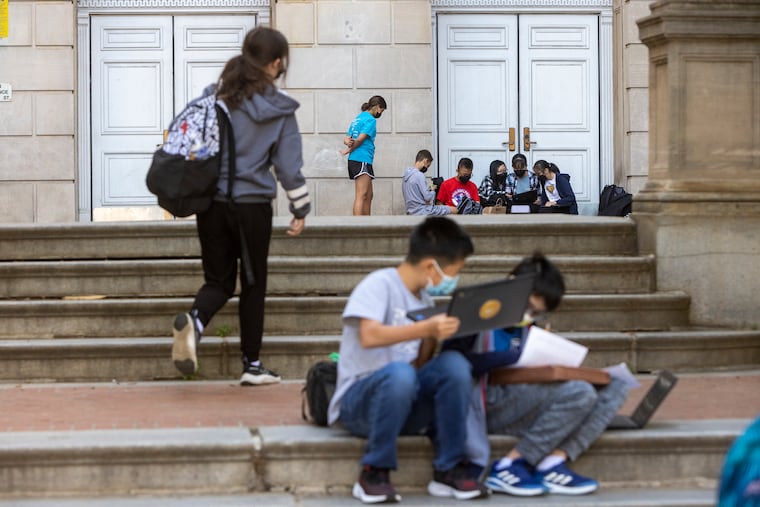Philly’s special admissions school process will no longer require a writing sample but will evaluate PSSA results
The district will continue to use a computerized lottery and waitlist system for those who meet the select schools’ academic qualifications.

Following last year’s contentious restructuring of its selective admissions process, the Philadelphia School District on Tuesday announced it will make two main changes to the admissions requirements to continue its efforts to make the undertaking more equitable: The writing assessment will be eliminated, and PSSA standardized testing results will return as criteria for its magnet schools.
As it did last year, the district will continue to use a computerized lottery and wait-list system for those who meet the academic qualifications of the district’s 34 special-admissions schools. Grades, attendance, and PSSA or alternative assessment scores will be weighted equally in this year’s selection process, which opens Sept. 16 for admission for the 2023-24 academic year, the district said in a news release.
“There is a place for the PSSA as a standardized measurement criteria for the school selection process, but we realize that it’s just one test score achieved on one day. Multiple measures of student performance are always preferable,” Superintendent Tony B. Watlington Sr. said in a statement. “We have also considered the very real impact the COVID-19 pandemic has had on our students and their families. PSSA admission criteria by school will be adjusted this year in light of the learning loss and other challenges our students have experienced.”
Students in the following zip codes the district has identified as underrepresented in its magnet classrooms will continue to receive preference for admission for four high schools and two middle schools: 19140, 19134, 19132, 19121, and 19133.
The 19139 zip code, covering a portion of West Philadelphia, will be added to receive admission preference, while 19135, which includes the Tacony neighborhood, will no longer receive preference, the district said.
That means that students from the selected zip codes who apply to the magnet schools — which include Central, Masterman, Academy at Palumbo, Carver High School of Engineering and Science — and meet other application requirements will receive admission offers, subject to space availability, the district said.
Students who did not take the PSSA last year may submit the results of an “equivalent assessment” before Nov. 4, the district said. The School District said it will determine and make public its standardized testing admission criteria by the end of September.
The district said it also plans to “appoint a diverse project team” of principals, teachers, counselors, assistant superintendents, parents, and students to provide recommendations and feedback on the updated selection process. In addition, the district said it plans to “engage in a competitive search” for an external auditor to review and issue a report on the new policy.
The changes to the process, including forgoing the writing sample and reinstating test scores, were made based on feedback from families, students, and school leaders who participated in last year’s school selection, a district spokesperson said. The district gathered that response through a survey and focus groups, which were offered in multiple languages, the spokesperson said.
Last fall, the district made fundamental changes to its long-standing admission policy, moving from a system in which principals had some say over who gained spots at the district’s special-admissions schools to a computer-based lottery for those who meet academic qualifications.
The district last year also opted to give preference to students who met the academic standards and lived in zip codes most underrepresented at its top magnet schools.
White and Asian students and students who do not live in poverty or receive special education services are overrepresented at the city’s most selective schools, historical data show. Changes to the admissions policy were designed to course-correct.
But those alterations drew immediate and sustained backlash. While some said the policy brought needed changes to a district attempting a reckoning over issues of race, class, and resources, others said it was instituted with no notice and in sweeping ways that penalized many students it was supposed to help.
» READ MORE: Philly schools changed special admissions process in the name of equity, but some parents say it’s penalizing kids
Some parents even sued the district in federal court, saying the school system adopted a “blatantly unconstitutional, race-based” system in the name of antiracism and equity.
An analysis of selective school admissions under the new policy shows mixed success. While more students, and more students of color, met admissions criteria, significant disparities remain — particularly at the city’s most elite schools. Only 2% of Black and 3% of Latinx eighth graders citywide met the bar for Masterman entry for the 2022-23 admissions cycle, for instance, and 8% of Black and Latinx students hit Central’s target — and those numbers speak just to eligibility, not to admissions.
District officials last year acknowledged some hiccups in the process but said they were proud of its success.
» READ MORE: Philly schools overhauled the magnet-school admissions process in the name of equity. Did it work?
The district has said it will host three town-hall sessions this month for parents and students to learn more about its new process, with more information available at www.schoolselect.philasd.org.